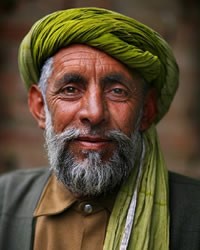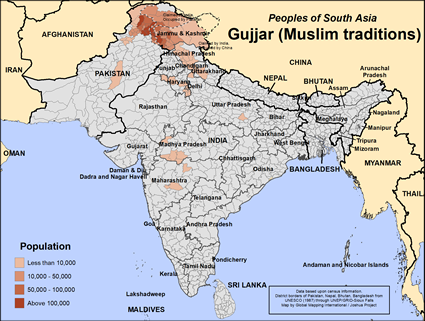Gujjar (Muslim traditions) in India

Photo Source:
Copyrighted © 2026
Matt Brandon All rights reserved. Used with permission |

Map Source:
People Group data: Omid. Map geography: UNESCO / GMI. Map Design: Joshua Project.
|
| People Name: | Gujjar (Muslim traditions) |
| Country: | India |
| 10/40 Window: | Yes |
| Population: | 1,025,000 |
| World Population: | 3,601,000 |
| Primary Language: | Gujari |
| Primary Religion: | Islam |
| Christian Adherents: | 0.00 % |
| Evangelicals: | 0.00 % |
| Scripture: | Portions |
| Ministry Resources: | No |
| Jesus Film: | No |
| Audio Recordings: | Yes |
| People Cluster: | South Asia Tribal - other |
| Affinity Bloc: | South Asian Peoples |
| Progress Level: |
|
Introduction / History
Gujjars (also known as Gurjars) entered India along with White Huns in 5th century A. D. from central Asia. Some of their clan names such as Hun and Aftali indicate that they were a part of the Hun tribe. They established their rule in present day Rajasthan by the name Gurjaratra in the 7th century A. D. Mihr Bhoja became their emperor, who expanded the Gujjar area to almost the entire northwestern part of India. There are several places in India and Pakistan named after their name as well as their different clans names. Three states ruled by Gujjar kings were added to India at the time of its independence in 1947. Today the Gujjars are found living in almost all the northwestern Indian states. They also live in large numbers in Pakistan's West Punjab, Khyber Pakhtunkhwa, Sindh, Azad Kashmir, and in eastern Afghanistan.
What Are Their Lives Like?
In Jammu and Kashmir, Himachal Pradesh and Uttaranchal states, Gujjars are mostly pastoral nomads, having no villages or other permanent settlements. They roam behind their herds of cattle, sheep and goats on carts and horses. The Gujjars make their temporary settlements under tents in forest areas. They move to high altitudes in summer and return to lowland pastoral grounds in winter. In Haryana, Rajasthan and Gujarat a very small section of Gujjars is semi-nomadic while the rest of them in these and other areas are settled people participating in animal husbandry and agriculture. Gujjars of some areas are also viewed by other peoples as a community of criminals such as cattle thieves, horse thieves and looters. This is a misconception. Some of them are well-to-do and rich landlords. They have their own set of customary laws regarding their social life. The Gujjars are considered wrestlers and athletes from birth. In some areas while their other favorite sport is to lift huge, heavy stones. They also are known as good horse riders.
What Are Their Beliefs?
The Gujjars of India are mostly Sunni Muslims. Less than 10% would call themselves Hindus. The Muslim Gujjars try to obey the teachings of the Koran and the prophet Mohammad. They believe that by following the Five Pillars of Islam that they will attain heaven when they die. However, Allah, the supreme God of the universe, determines who enters paradise. Sunnis pray five times a day facing Mecca. They fast the month of Ramadan. They attend mosque services on Friday. If a Muslim has the means, he or she will make a pilgrimage to Mecca once in his or her lifetime. Muslims are also prohibited to drink alcohol, eat pork, gamble, steal, use deceit, slander, and make idols. The two main holidays for Sunni Muslims are Eid al Fitr, the breaking of the monthly fast and Eid al Adha, the celebration of Abraham's willingness to sacrifice his son to Allah.
What Are Their Needs?
The Gujjars need more education and to shun practices such as child marriages. They need to be uplifted from their poverty by incorporating modern techniques in animal husbandry and agriculture. Most of all the Gujjar need to hear and understand the message of Jesus Christ. He alone can forgive their sins and grant them the gift of eternal life.
Prayer Points
Pray for a spiritual hunger that will give the Gujjar people a desire hear and respond to the gospel. Pray for a disciple making movement that will bless the Gujjar people this decade. Pray for the Lord to send out workers to the Gujjar people and tell them about Jesus or Isa.